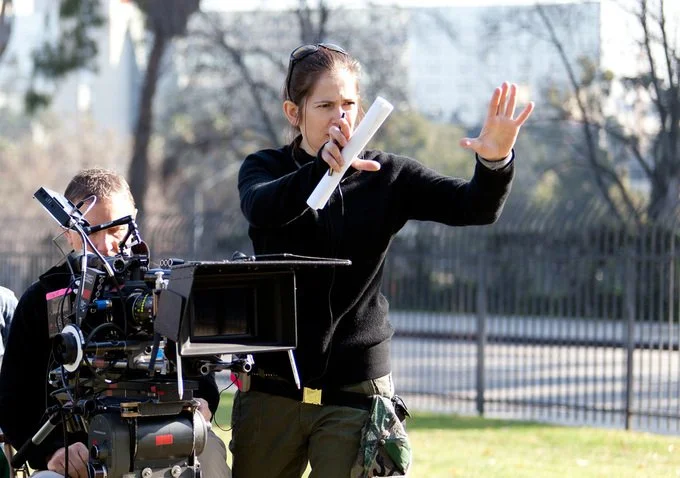Palestinian you should know: Lexi Alexander (Part 2)
Part one of this article is available here.
The following was originally published in the Palestine in America Film Edition. Please support our work by ordering a print copy, downloading a digital edition or becoming a subscriber.
Early Years
Alexander’s most famous films–Johnny Flynton, Green Street Hooligans and Punisher: War Zone–each provide a glimpse into her childhood.
Growing up in rural Germany, Alexander developed a love for soccer and fighting. By the time she was 16 years old, she was a professional kickboxer. Lexi would go on to win both the European and World kickboxing championships—accomplishments that would ultimately help her get to the United States.
Alexander jump-started her directing career with Academy Award-nominated Johnny Flynnton, which is based on a boxer who was accused of murdering his wife, but according to Alexander there are two sides to this story and things are not always as they seem.
“I remembered as a kid in the gym, you know, maybe as an 8- or 9-year-old, I was taking this heavy bag off, and I miscalculated the weight of it, you know, as just an 8-, 9-year-old. And I think that thing could have really hurt me because it was coming off and it was coming at me. [A] guy ran from the other side of the gym, all the way there to stop that thing from dropping on me. [Then] he kind of laughed and put it back on. I just never forgot that. So in a sense, you know, the little kid in that film, although that was a boy. But the little kid in that movie was kind of representing me,” Alexander told Palestine in America.
Alexander’s Wikipedia page says she was a part of a hooligan futbol group, but she rolls her eyes at the notion. She said her brother and his friends would take exception as well.
“My brother had to babysit me, and because I was a big football fan, I got caught up in going to the game every Saturday, and then I saw it go off–the fight,” the Green Street Hooligans director said. “I mean, it's a very organized thing, you know, and when I saw it go off, I guess I was already a little filmmaker, because I wanted to document it all. And they always wanted to have photos of when it goes off.”
Not only did these experiences end up reflected in the films she’d go on to create, but they catapulted her to the United States, where she has now spent a majority of her life.
She met Chuck Norris and other accomplished fighters at a fighting tournament, and they sponsored her immigration across the pond. She arrived on an H1 visa, which required Alexander to hold a job to keep her status.
Lexi in Hollywood
When she first arrived in the U.S., Alexander worked as a stunt double before transitioning to directing and writing. She did stunts for movies like Batman and Robin, but she realized fairly quickly that female stunt doubles are not as protected as their male counterparts. She says in that industry, they often go without proper safety equipment because of the lack of clothing they usually wear in scenes. Once she realized the job wasn't sustainable for her body, she began taking classes that would help her move on to safer jobs behind the camera.
As soon as she had her script for Johnny Flynton finalized and the money she needed to produce the film saved up, Alexander got to work executing her “calculated” plan to become recognized and get more work as a director.
Thanks to her background in fighting, Alexander was able to travel the U.S. giving fighting lessons. She was being paid approximately $2,000 to $3,000 per seminar, plus travel and hotel expenses.She found that if she only ate food from gas stations that accepted her for credit cards, she would be able to save up the $40,000 in just one year.
She hit a few bumps along the road of raising the funds. Alexander wasn't used to not being able to afford doctor visits and medicine,as she grew up in a country where healthcare is a right not a privilege. As a result of her diet, she got sick and had to rely on fish pills instead of antibiotics to help her heal.
“I didn't have health insurance,” she explains. “Now this is a weird thing. That's also just in this country. This normally doesn't exist in any other country, right? Where you get sick and you have no money to pay for it…then somebody in this directing class that I was taking said, ‘you know, oh, we all get sick and we all don't have insurance, you go to the Petco and you take these fish pills.’”
When Johnny Flynton earned its nomination, Alexander felt as if she had “made it,” and that all her hard work had paid off. Successful as she may be, however, she admittedly is still working hard to keep her place in the industry. She describes it as if she’s hanging on to a ledge over a steep fall. She especially felt this way after being the first woman to direct a Marvel or DC film, when she was hired to create Punisher: War Zone.
The initial reception of Punisher wasn’t pleasant. Although many recognized the cinematography was done very well,critics like Roger Ebert called the film too gory. It is also well documented that the movie did not receive support from the studio. The film was released in a throwaway fashion at the end of the year and was slated against mainstream successes including Slumdog Millionaire, Marley and Me and Benjamin Button. Many critics agreed Punisher was violent and gruesome, but even Ebert couldn't deny that it was well-produced.
“The Punisher: War Zone is one of the best-made bad movies I've seen,” the critic wrote. “It looks great, it hurtles through its paces and is well-acted. The soundtrack is like elevator music if the elevator were in a death plunge. The special effects are state of the art. It's only flaw is that it's disgusting.”
The studio’s low marketing budget for the movie and being considered a box office failure made Alexander feel dejected. Comedian Patton Oswalt wrote a review of the film that helped her realize it wasn't her fault and gain a new friend simultaneously.
“All of this mayhem, insanity and just-plain bugfuckedness is contained in one of the most beautifully shot films I’ve seen this year…And director Lexi Alexander, a former stunt woman and kick boxing champion, has just groin-punched her way to the front of the line in the Nutball Director’s Pantheon,” Oswalt wrote on his website.
Alexander shared that after reading his words she called him and said, “I thought I had messed up,” And he replied,”‘Oh my god, I'm so glad this is the best movie I've ever seen.”
“That's how we met,” she told Palestine in America. “A good reason my career's still going and I haven't quit is because he kept encouraging me to not quit.”
To read the rest of the article, order a print copy or download a digital version.
To learn more about Lexi Alexander, listen to part two of our conversation with Lexi Alexander .




